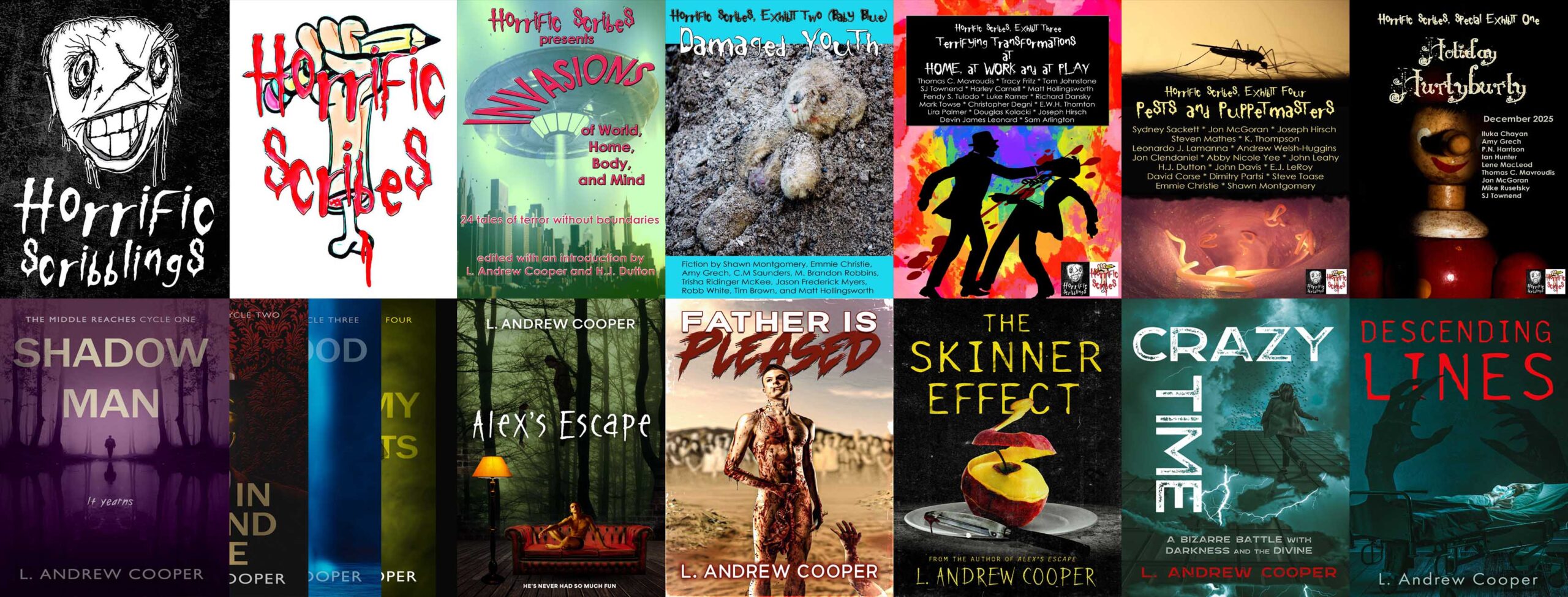Spotlight: Stephen Zimmer’s Hellscapes, Vol. 1
I’m lucky to have Stephen Zimmer make my site a stop on his part of the tour he’s sharing with Steven Shrewsbury to celebrate the launch of several exciting new projects. I’m focusing on Zimmer’s distinctive collection of interrelated horror stories, Hellscapes, Volume 1. On this page you’ll find background information and bonus tidbits; on the site’s main page, you’ll find my review of the book.
About Stephen Zimmer: Stephen Zimmer is an award-winning author of speculative fiction, whose works include the Fires in Eden series (Epic Fantasy), the Rising Dawn saga (epic-scale Urban Fantasy), the Harvey and Solomon tales (Steampunk), the Hellscapes tales (Horror), and the Rayden Valkyrie tales (Sword and Sorcery).
He is also a writer-director in moviemaking, with feature and short film credits such as Shadows Light, The Sirens, and Swordbearer.
Hellscapes, Volume 1: Book Synopsis: Journey into realms of darkness and explore the regions where angels fear to tread! Welcome to the Hellscapes, featuring tales of the infernal in settings where the horror never ends and the inhabitants experience the ultimate nightmare.
In “Blood Dreams” follow the tale of a woman who knew great political authority and influence in life, as she discovers the reward awaiting her in the next world. “The Grove” welcomes a new arrival, a wealthy man who is looking forward to a weekend of indulging in lust and libation, as he has for many years in this secluded convocation for the elite. Something is different this time, though, and he soon finds that his visit will be taking a very different turn. In “The Smallest Fish”, the story is told of a ruthless business mogul who finds himself in an abandoned, ruined version of the city he knew well, in life. This city won’t be remaining vacant for long. “Drowning in Tears” tells the story of a young man’s unhealthy obsession for a suicidal girlfriend that leads him on a path of severe transformation. The final tale of Volume 1, “Lords of War”, follows the story of a man who wielded military power on a worldwide scale as a Secretary of Defense, who now learns the deeper nature of war and what kinds of monstrosities it breeds.
On Amazon.com, you can find both print and e-book formats.
An Interview with Stephen Zimmer
by L. Andrew Cooper
Mr. Zimmer, thank you for taking the time to answer some questions about Hellscapes, an unusually vivid collection of interrelated horror tales.
LAC: You cite several classical sources of inspiration, especially Dante and Milton, and begin the tales with epigrams from classics as well. How do you think that classic visions of Hell, like the ones in the Inferno or Paradise Lost, connect with modern audiences? And how similar are your visions of Hell(s) to these classical visions?
SZ: The classic visions of hell evoke something more primal and elemental within us. Things like darkness and the danger of fire have been with humankind since its roots. The classical visions of hell heap these primal fears on you in great abundance, as the imagery of various rings of hell in Dante’s Inferno attest.
SZ (cont.): The visions of Dante and Milton, and those echoed in numerous medieval sermons, visions of saints, and other depictions that have been saved for posterity all tend to share similar imagery. Hellscapes does give a nod to these depictions in terms of some grand, fiery imagery and the idea of something on a massive scale. With regard to Dante and medieval homilies, Hellscapes also reflects a very personalized focus of the demonic inhabitants, on the doomed souls therein.
LAC: Which Hellscape is your favorite? Why?
SZ: I always find it hard to pick favorites, as I am very attached to anything that I complete and put forth to have published. Nevertheless, I could give a slight nod to “The Smallest Fish.” I like the way it swings between feelings of emptiness in the city at the beginning to the trapped environment later. Of the various “guides” that appear in these stories, I am fascinated with The Stranger, who is a more complex character that will be revealed more and more with future tales. The Stranger, and this tale, show how madness and awareness are so intertwined in this type of realm. It takes the sense of hopelessness to a maniacal level.
SZ (cont.): This story also reflects the nature of evil and the lust for power, in that there is a dynamic of control and consumption whereby the stronger absorb and control the weaker (as opposed to the liberation/freedom of a heaven). The portrayal in “The Smallest Fish” is more metaphorical, of course, but it does show that dynamic of a hierarchy based upon control and consuming the lesser. I would suggest you can see this dynamic and hierarchy in the world today, if you look carefully enough.
LAC: Dante’s Inferno lavishes description on torturous punishments that mirror the sins of the condemned in Hell. In the series of Saw films, grotesque traps torture people in ways that mirror their own shortcomings in life. Interestingly, David Edelstein coined the term “torture porn” in an article that lumped the movie Saw together with both Hostel and The Passion of the Christ, which suggests that religious displays and fixations have long pivoted on spectacles of torture. Was Dante writing torture porn? Are you? Why or why not?
SZ: Personally, I would differentiate a movie like The Passion of the Christ from Saw/Hostel type films. In the latter, it is the grotesque violence or torture that is the object, meant to shock and evoke a response purely in and of itself in the viewer. The violence in The Passion of the Christ is meant to produce a strong reaction as well, but there is a deeper intent to that violence in that it serves to convey the extreme pain and suffering endured in the process of crucifixion.
SZ (cont.): This is why I do not feel Dante was writing torture porn, and nor am I. The grisly, violent aspects of hell are meant to show readers just how horrific and varied the realms of hell can be, and also to show consequences of evil. The pain being inflicted is not being done for its own sake, but is the harvest of what these particular individuals cultivated throughout their lives, in their actions and choices. The Hellscapes take a more individualized tone with each depiction and story, whereas Dante’s visions tended to focus upon “categories” of sin, where groups were suffering in a certain manner tied to one particular sin.
SZ (cont.): The suffering and vivid scenes are meant to be a warning, not something to savor or derive any degree of contentment from, as the idea of torture porn drives at.
LAC: Dante’s trip through Hell places him at a distance from the suffering of the damned, mediated by the descriptions and explanations of a guide. The stories in Hellscapes immerse readers in the perspectives of the damned, eliminating that distance as well as the helpfulness of a guide. In fact, your stories emphasize that characters must figure out for themselves what’s going on. Why did you choose the perspectives you did, and why must your characters explore their realms without a guide?
SZ: In my stories, the damned must come to the realization of not only where they are, but also, and more importantly, why they are there. I do have some figures like the Stranger and the Soldier that come along and provide some nudges, but these are stories about personal accountability. In a way, they are small journeys of self-discovery, as they come to realize their fates. To me, this is very important. There is an acceptance of their crime inherent in this path, one that they cannot make excuses for or find scapegoats to cover them.
LAC: Many of the damned in your stories are wealthy and politically powerful. Dante and Milton certainly had political agendas—do you? What is it? Or if you don’t, why do you focus as much as you do on such characters?
SZ: I think there are some tremendous evils in the world that tend to get a pass. A single violent murder is more obvious to most people, but I’m always amazed at how those whose decisions result in the deaths of multitudes, the suffering of far more, the destruction of families, and so many more harmful results tend to get a pass. Things like what Bernie Madoff did gave birth to loads of darkness in the lives of so many, but there are many more like him who will never see a court or jail, at least in this world.
SZ (cont.): These decisions by power elites are done for the sake of power and profit, and to me they are every bit as vile and despicable as a mass murderer. I hoped to convey this in Hellscapes, when this type of individual is held accountable and made to comprehend the scale of evil they gave birth to.
SZ (cont.): I’m not taking a political stance in the sense of a certain persuasion or platform, but I am saying that things in the realm of politics do have moral consequences and that those who ruin great numbers of lives through their conscious decisions in the political arena should be held accountable.
LAC: Three of the five tales feature minority protagonists. The first story focuses on a politically powerful woman, the second focuses on a similarly powerful man attracted to other men, and the third story focuses on a successful businessman with a Hispanic name. I’m sure your intentions are good, but given that the book calls attention to political issues pretty often, people are bound to wonder: why did you make these choices?
SZ: It was important to me to have a diverse cast precisely because I did not want anyone getting tangled up in an issue of ethnicity, gender, etc. In fact, ethnicity, gender, and the like have no bearing whatsoever as to why the characters are in the realms of the infernal. It was purely their actions and choices in life that got them there. As you will see in the stories, the focus is entirely upon actions and choices, and in no way makes any issue out of the gender or ethnicity that they held in their physical lives.
SZ (cont.): Hellscapes stories are for a modern audience, so I also believe there should be a diversity in the main characters just as there is a diversity in the audience. Evil and issues of moral choice makes no distinction regarding gender, ethnicity, etc. It manifests in all walks of life, all over the world. Therefore, the tales should reflect a broad range of characters to most honestly explore the nature of evil.
LAC: Damnation is a grim subject, and though you do have some surprises up your sleeve, you’re pretty clear from the outset that the characters in these stories are screwed. To write so much about hopelessness: what drew you to this subject?
SZ: I have always been fascinated with the concept of hell, from near death experience accounts, to the depictions in various religions, visions, concepts from writers, and so much more. To me, it is the ultimate horror, a place that you cannot escape from and where not even death can end the suffering.
SZ (cont.): It also reflects the idea of accountability. The fact is that many who do great evil, especially those of great wealth or political power, do escape accountability. They lead comfortable lives, things go their way, and they often die peacefully. The idea of hell, even a temporal one (which I could write an entire essay on, as it is a very viable concept), gets at a bigger picture where you can’t avoid the consequences of your actions, no matter how influential or wealthy you are.
LAC: If you could choose one emotion and one (spoiler-free) idea to linger with readers after they finish Hellscapes, what would it be?
SZ: As far as ideas, I’d like to suggest that actions have consequences. The choices we make do have effects on the lives of others. Those in high places that regard people as statistics are capable of unleashing tremendous evils and sufferings in the decisions they make, but it is also important for everyone to keep in mind that the choices we make can give root to either evil or good. It is up to us.
In regard to feelings, the emotion would be a gladness of being alive, and knowing that we all can put our hearts towards a moral path that does not lead to the destruction of the spirit (and for those who do not believe in such things, let’s just say the destruction of your greatest potential).
SZ: Thank you for the opportunity to address some great questions! I hope my answers helped shed a little more light on the nature of these tales!


